As we stand in 2025, we’re witnessing a transformative era where technology intertwines intricately with our professional lives, altering landscapes in ways once reserved for science fiction. We are seing a future where our work environments are completely transformed, urging us to innovate, adapt, and hone our technology skills. Let’s explore what this transformation entails for those of us in tech, design, and recruitment.
Tech Trends: The Winds of Change
From 2025 to 2030, technology trends like artificial intelligence and automation are going to drive major business transformations. These technologies are reshaping business models, enhancing operational efficiencies, and revolutionizing how services are delivered. Companies are not just adopting these innovations; they’re embedding them as core elements, crafting an integrated digital world. For professionals immersed in tech or creative fields, this is your call to integrate these advancements as foundational components of your practice.
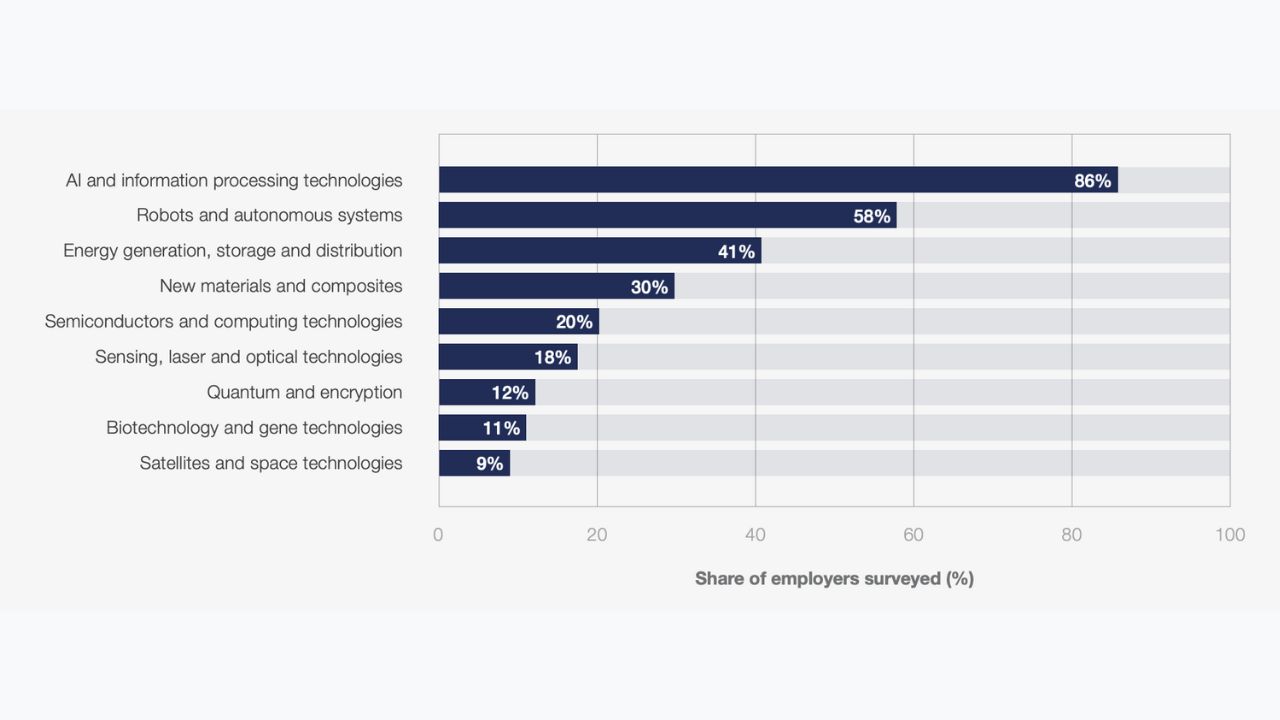 Technology trends driving business transformation, 2025-2030 - Source World Economic Forum, Future of Jobs Survey 2024
Technology trends driving business transformation, 2025-2030 - Source World Economic Forum, Future of Jobs Survey 2024
“Of the nine technologies, three stand out as being expected to have the greatest impact: robots, energy and AI. But it is artificial intelligence (AI) and information processing technologies that are expected to have the biggest impact – with 86% of respondents expecting these technologies to transform their business by 2030”
– Future of Jobs report 2025
Growing and Declining Job Roles: The Field of Play
In this transforming landscape, certain roles are emerging while others are in decline. AI Specialists and Data Scientists are among the fastest-growing roles, reflecting a profound shift towards data-driven decision-making. Conversely, roles heavily dependent on manual input, such as traditional clerical jobs, are gradually declining as automation takes over. This trend emphasizes the need for professionals to pivot towards roles that capitalize on technological advancements and analytical acuity to stay relevant.
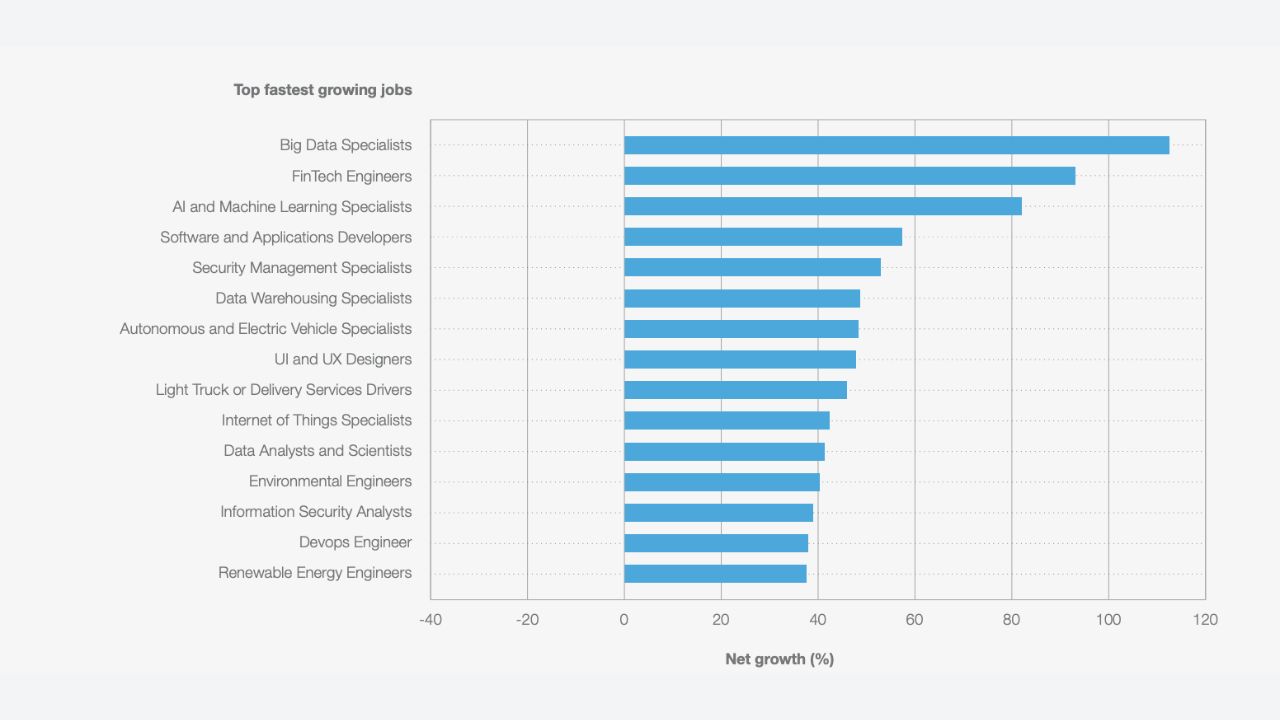 Fastest-growing jobs, 2025-2030 - Source World Economic Forum, Future of Jobs Survey 2024
Fastest-growing jobs, 2025-2030 - Source World Economic Forum, Future of Jobs Survey 2024
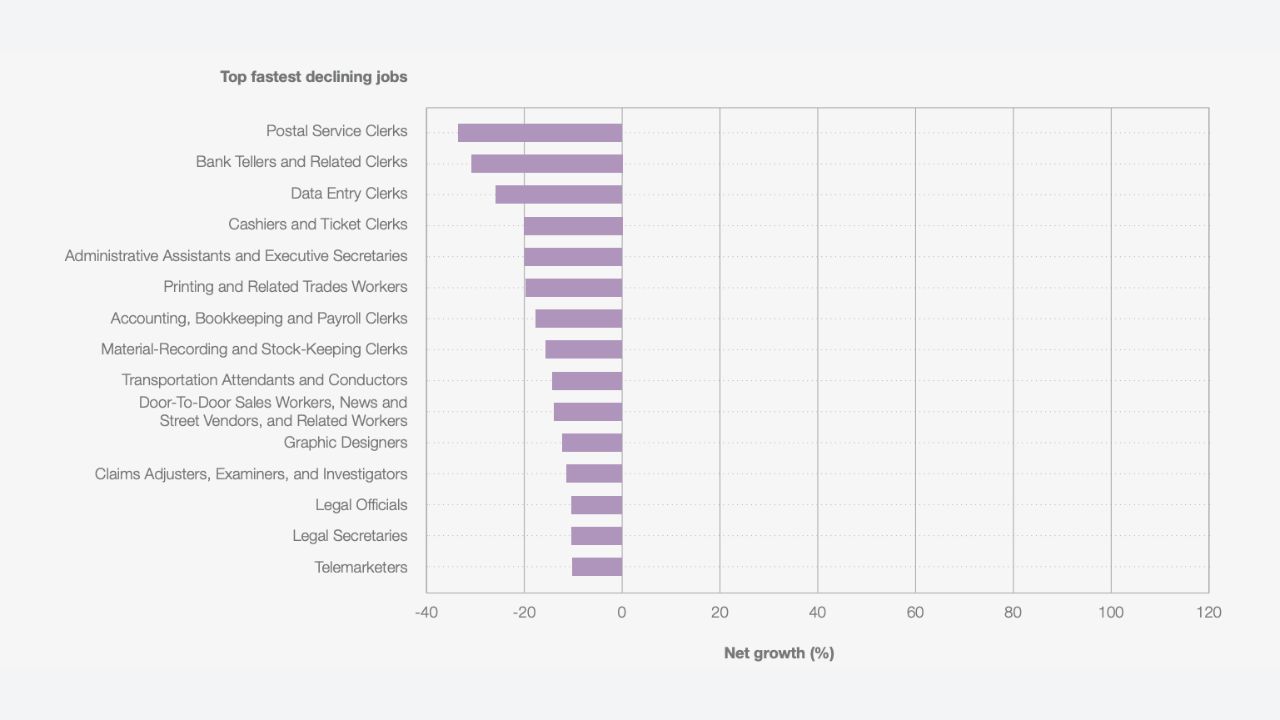 Fastest-declining jobs, 2025-2030 - Source World Economic Forum, Future of Jobs Survey 2024
Fastest-declining jobs, 2025-2030 - Source World Economic Forum, Future of Jobs Survey 2024
“Broadening digital access, AI and information processing technologies, and robots and autonomous systems are the primary drivers for this decline. Aging and declining working-age populations and slower economic growth also contribute to the decline in clerical roles.”
– Future of Jobs report 2025
Skills on the Rise: Tools for Tomorrow
As our environment evolves, the demand for new skill sets is rising. Key skills include digital literacy, data analysis, and strategic problem-solving. However, as technology takes over routine tasks, soft skills like emotional intelligence, adaptability, and effective communication are gaining ground. They foster collaboration and innovation, essential for bridging the gap between advanced technology and human interaction. Building these skills prepares you for a future that values not only technical proficiency but also human-centric capabilities.
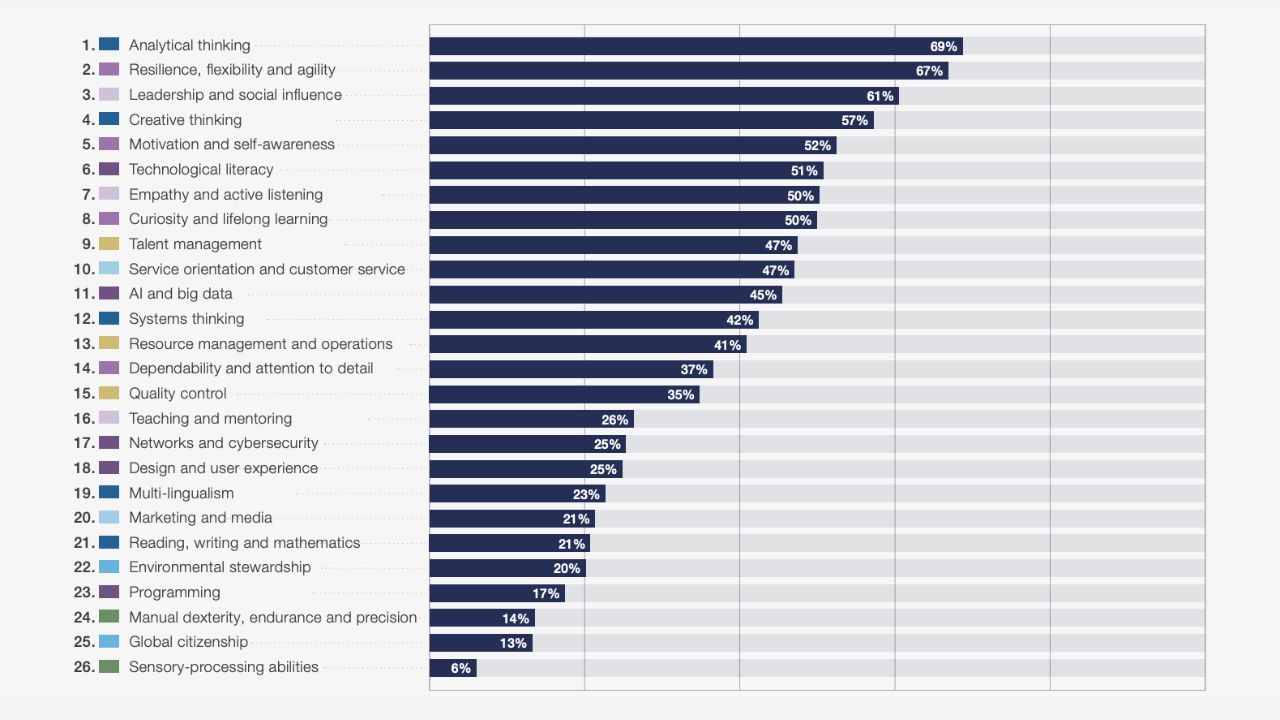 Core skills in 2025 - Source World Economic Forum, Future of Jobs Survey 2024
Core skills in 2025 - Source World Economic Forum, Future of Jobs Survey 2024
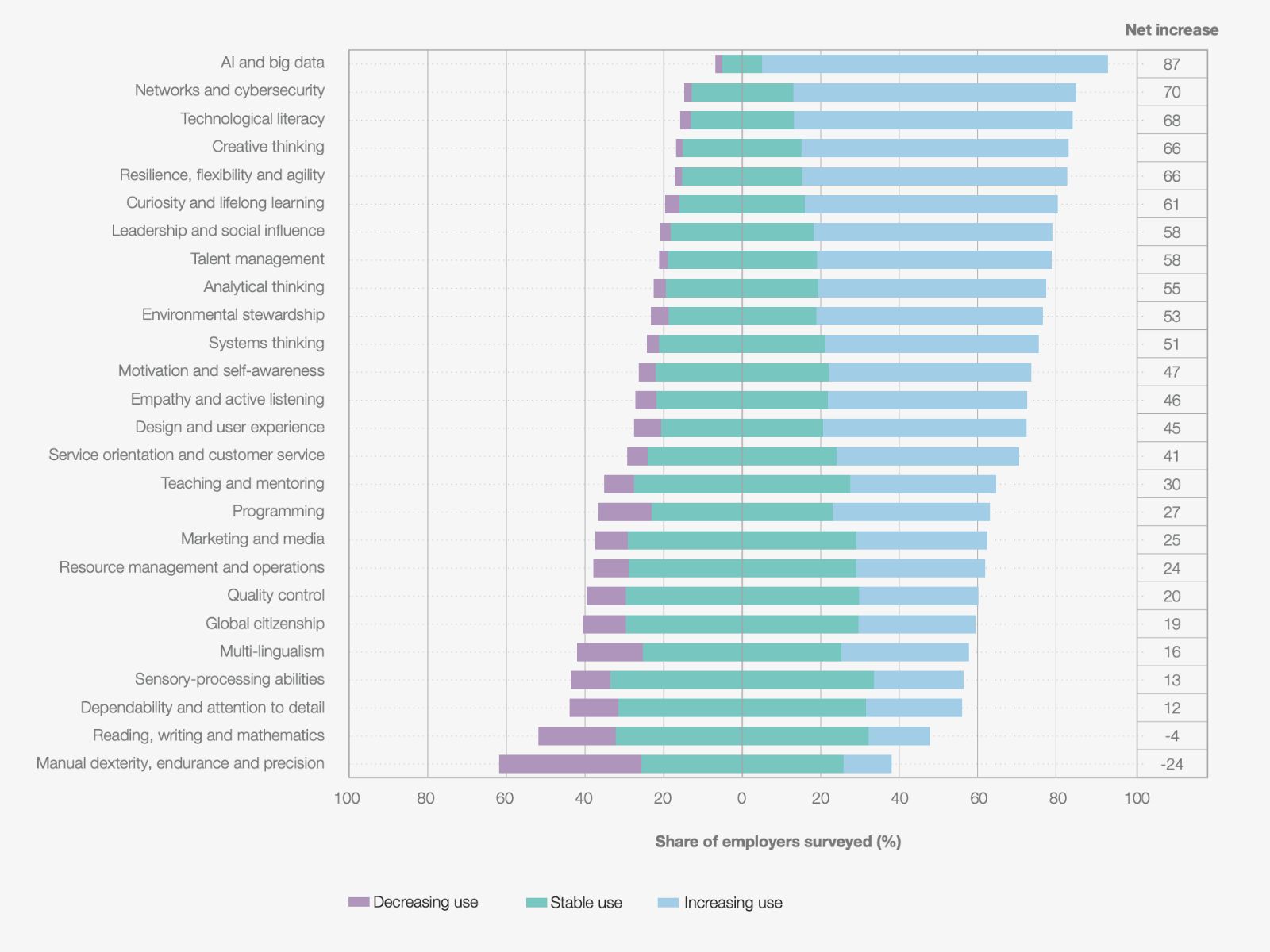 Skills on the rise, 2025-2030 - Source World Economic Forum, Future of Jobs Survey 2024
Skills on the rise, 2025-2030 - Source World Economic Forum, Future of Jobs Survey 2024
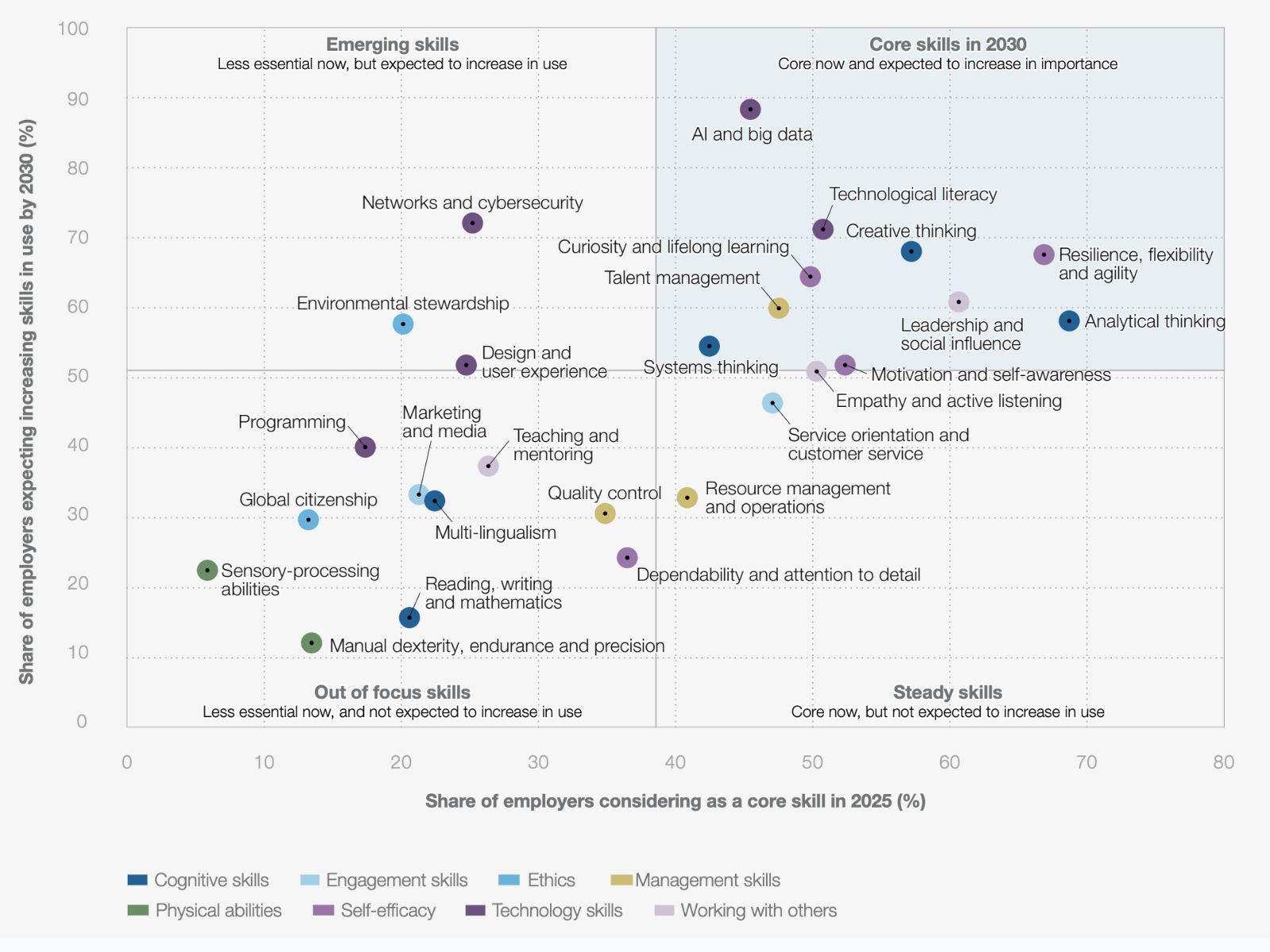 Core skills in 2030 - Source World Economic Forum, Future of Jobs Survey 2024
Core skills in 2030 - Source World Economic Forum, Future of Jobs Survey 2024
“AI and big data are predicted to see significant growth across nearly all sectors. In the top 10 industries, over 90% of respondents expect this skill to increase in use. The lowest growth shares are observed in Agriculture, Forestry, and Fishing (70%) and Accommodation, Food, and lLisure industries (69%). This highlights a broad-based but uneven embrace of advanced technological skills across industries.”
– Future of Jobs report 2025
Drivers of Skill Disruption: A Changing Current
The catalyst for skill disruption is largely technological advancement, accompanied by demographic shifts and globalization. With businesses operating in increasingly diverse markets, professionals need to be adept at navigating multicultural and technology-driven environments. Staying informed and continuously updating your skillset is crucial to adapting to these shifts and thriving in a dynamic professional ecosystem.
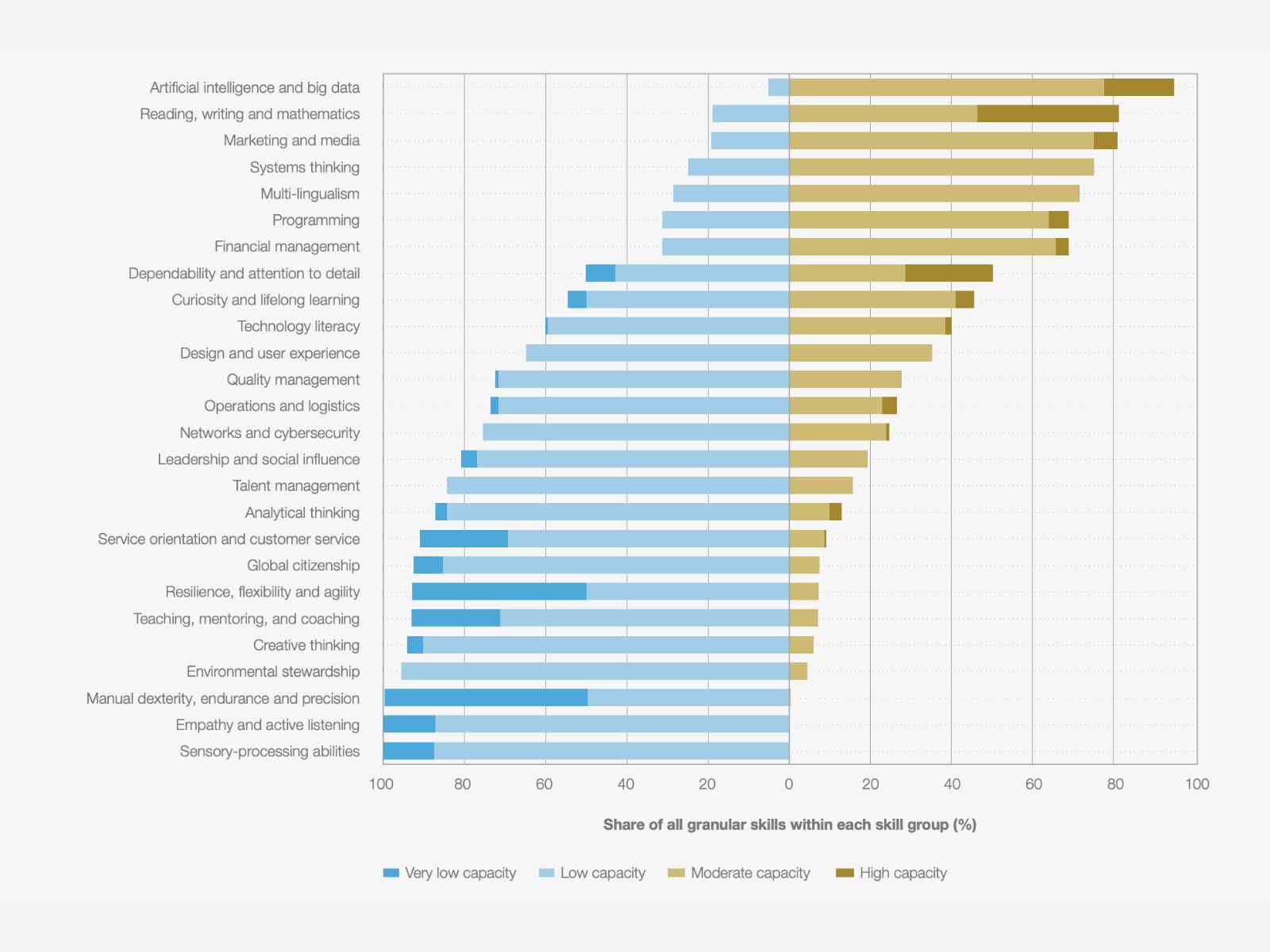 Capacity of GenAI substituting a human in performing a given skill as a percentage share of all granular skills within each skill group.
Analysis based on GPT-4o, with over 2800 granular skills from the Indeed database as of August 2024. - Source Indeed analysis; World Economic Forum, Global Skills Taxonomy.
Capacity of GenAI substituting a human in performing a given skill as a percentage share of all granular skills within each skill group.
Analysis based on GPT-4o, with over 2800 granular skills from the Indeed database as of August 2024. - Source Indeed analysis; World Economic Forum, Global Skills Taxonomy.
Workforce Strategies: Crafting the Future
Between 2025 and 2030, upskilling emerges as the leading workforce strategy, with 85% of employers globally prioritizing it, as reported by the World Economic Forum. This focus spans all income levels, with high-income economies slightly ahead in adoption. Automation, the second most common approach, is set to accelerate, with 73% of employers leveraging it to optimize processes and augment tasks, particularly in high-income regions. Additionally, 70% of organizations plan to hire talent with emerging skills, while 51% aim to transition staff into growing roles internally. These strategies reflect a dynamic response to macrotrends, preparing the workforce for a rapidly evolving future.
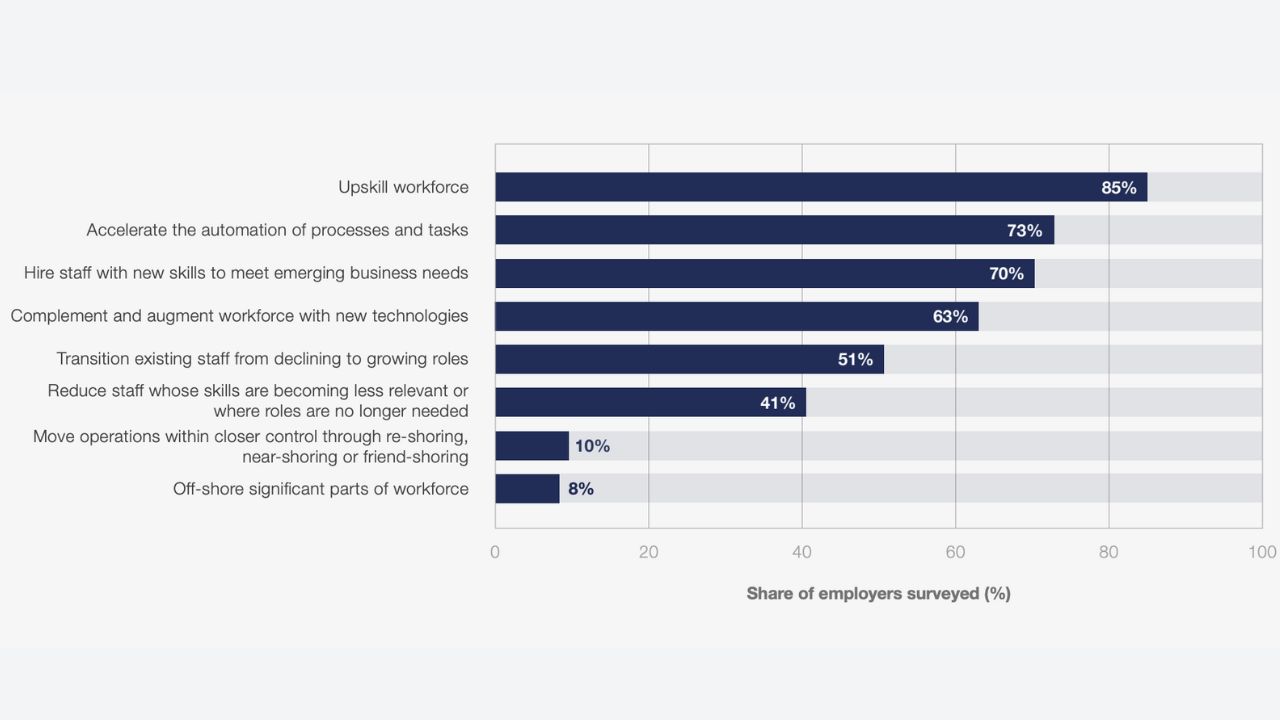 Workforce strategies, 2025-2030 Share of employers surveyed planning to adopt the stated workforce strategies. - Source World Economic Forum, Future of Jobs Survey 2024
Workforce strategies, 2025-2030 Share of employers surveyed planning to adopt the stated workforce strategies. - Source World Economic Forum, Future of Jobs Survey 2024
“Upskilling is identified as a top 3 priority across all geographies, and economies at all income levels, with employers in high-income economies (87%) slightly ahead of those in upper-middle-income (84%) and lowermiddle-income (82%) ones.”
– Future of Jobs report 2025
In conclusion, as the world and technology continue to evolve, we must evolve with them. Embracing change, fostering innovation, and continuously upskilling are no longer optional—they are essential for thriving in this dynamic landscape. The future isn’t a distant destination; it’s a journey we shape through our actions today.
To better understand the trends shaping the workforce and the strategies to navigate them, I encourage you to explore The Future of Jobs Report by the World Economic Forum. Dive into the insights and be part of the conversation shaping the future of work.






